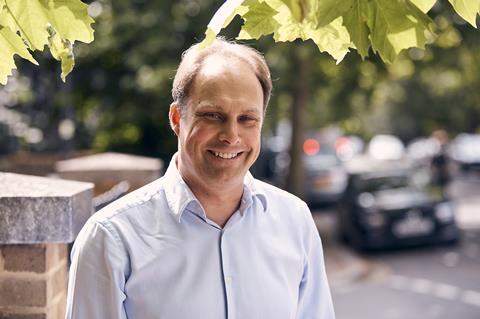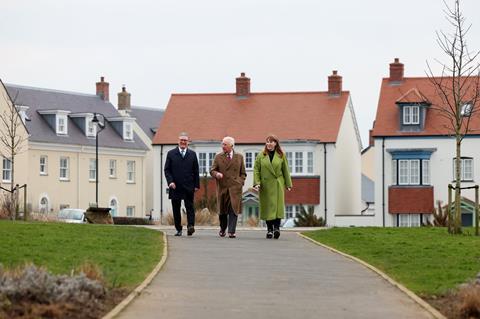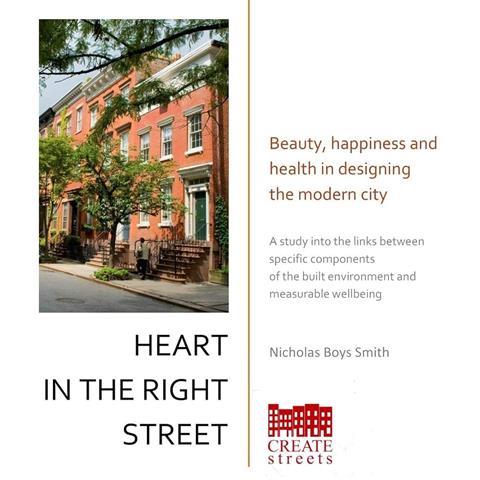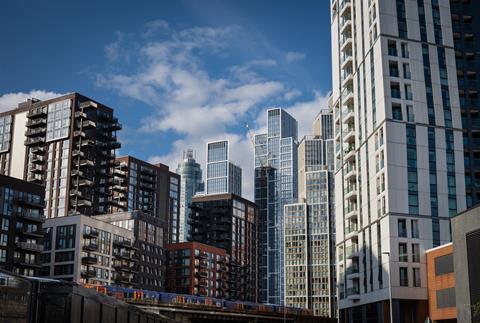Mary Richardson speaks to the founder of Create Streets about popular taste, the design challenges facing Labour’s housebuilding push, and why architects still struggle to engage with what ‘normal’ people really want

With a new Labour government pledging to deliver 1.5 million homes over the next five years, questions are mounting not just about how and where they will be built, but what kinds of places will be created. There is broad consensus that the country needs more housing; less clear is what the government means by “good design” or how it intends to win public support for large-scale development.
Into this vacuum, the ideas of Nicholas Boys Smith remain strikingly relevant, if often divisive. Boys Smith is not an architect or planner, yet few have shaped recent debates on planning and design as forcefully.
Through his social enterprise Create Streets, his work on the Building Better, Building Beautiful Commission, and his leadership of the now abolished Office for Place, he played a major role in influencing built environment policy under the previous government and helped to reframe the conversation around what good urbanism looks like. At the same time, he has drawn criticism from parts of the design community, many of whom view his advocacy of traditional and popular styles with deep suspicion.
The closure of the Office for Place in October 2024 appeared to mark a turning point in Boys Smith’s influence within government. Writing in The Critic shortly afterwards, he described the decision as “a source of huge sadness”, adding, “I am sad that our attempt to create a small, independent and powerful voice for the importance of place within government has hit the buffers.”
>> Also read: Interview: Nicholas Boys Smith on design deregulation and the Office for Place
Since then, he has focused on Create Streets, which continues to work with councils and developers on design codes, masterplans and public engagement.
However, in the current political climate, it feels like much is still up for grabs and Boys Smith is not one to stand on the sidelines. Keir Starmer has publicly expressed a preference for Georgian architecture, and both the prime minister and Angela Rayner joined the King on a recent high-profile visit to Nansledan, the Duchy of Cornwall’s traditionally inspired extension to Newquay.
The scheme has been masterplanned by Hugh Petter of ADAM Architecture, a Boys Smith ally. Questions of style, taste and public support, it seems, are never far from the surface within the national conversation about housing and planning.
Create Streets
When BD meets Boys Smith, he is upbeat and eager to share new research from Create Streets. But he is also direct, offering a sharp critique of contemporary development and issuing a warning to the profession: unless architects design the kind of places that people actually want, they risk being cut out of the process altogether.
Boys Smith holds a double first in history and an MPhil from Cambridge, where he was president of the Union. He has been a commissioner for Historic England and has lectured at the University of Buckingham. His background may not be conventional for a figure in the built environment, but his influence has been undeniable.

He set up Create Streets in 2012, the name in part a riposte to the Corbusian admonition against traditional streets and urbanism (and a reminder too that traditional street patterns work). His motivation was “frustration with the low quality of too much recent development and [with] irrational decision-making”; sentiments with which many in the sector, regardless of their modernist or traditionalist sympathies, can surely concur.
Starting a pressure group focused on urban planning and building design was an audacious move for someone with little background in the subject. Some might call it arrogant, others simply a “can do” desire to get things done in the face of a British development and housebuilding culture that has failed to produce volume homes and places of the quality anyone would wish for.
And lots has been done.
Style wars
Boys Smith has, however, found himself caught up in architecture’s style wars: decried for a perceived support for traditional and Classical building styles, something not popular among old-school modernists. His background in City finance and known Conservative sympathies do not help. For many in the profession, he is on the “wrong” side – in both the style wars and in politics.
But this stance perhaps says more about them than about Boys Smith, who is clear that what he favours is good (which, for him, means evidence-based) design, rather than traditional or Classical styling for ideological reasons.
Asking the wrong questions
Boys Smith argues that architects and designers are often asking the wrong questions. “They should not start with the question they are taught to prioritise at architecture school: ‘Is this new? Is it innovative?’ ” he says. “Probably now they are being taught to ask, ‘Is it sustainable?’ as well, which is a good question to ask.”
For him, the core concern should be something simpler and more fundamental: “Does this make people happy? Will people feel at home here?”
He continues: “Is this a building so lovely that, when the use I am currently building for ends – which it will, whether in 10 or a hundred years – will people just intuitively and naturally wish this building to continue to exist because they love it?”
These, he says, are the questions designers should be asking. “And that,” he adds, “is also a deeply sustainable way to think about your building.”
Nicholas Boys Smith writes for BD
Planning more clearly is the way to delegate decision making
How Coventry beat Paris and London on the road to the future
It is hard to argue with that, though Boys Smith may be doing building designers a disservice, as the best of them do, in fact, prioritise the user experience. And, of course, many of the developments he criticises are not designed by architects at all.
At the same time, the housing shortage is arguably so acute that ambitions such as loveliness and beauty can appear like first-world concerns in a country which many see as struggling to deliver even basic infrastructure.
But that does not mean they are not worthwhile goals. Pragmatically, in an environment where too many new developments are blocked by local opposition, designing housing that people genuinely like the look of, and that functions well for communities, can only help to shift attitudes in favour of new building.
This desire to confront resistance head-on by addressing local concerns and aiming to deliver development that the majority actively support is a key driver behind Boys Smith’s wider agenda.
Design disconnect
The real difficulty with what he says is, of course, that beauty is in the eye of the beholder. And, without wanting to reopen the “beauty” debate, there is surely a kernel of tricky truth in the issue Boys Smith highlights when he suggests that architects often do not like the same buildings that “normal” people do.
He draws attention to research from Daivd Halpern (the psychologist and former civil servant who founded the behavioural insights team, commonly known as “the nudge unit”) and others that shows the disconnect between the design preferences of architecture students and the rest of the population. In the research, Boys Smith explains, “the architecture students’ favourite building was everyone else’s least favourite and vice versa.
“The consistently least popular of 12 buildings shown to non-architect students proved to be the most and second-most popular among two groups of architect students. The disconnect also got worse the longer architecture students had been studying.”
This resonates with something in the ether. That other non-architect whom architects love to hate, Thomas Heatherwick, makes a similar point in his book, Humanise.
They know what they like
Boys Smith says that “in most studies we do, between 70 and 90% of people prefer a more articulated, traditional and coherently complex set of buildings.” But people are not necessarily asking for something that looks historic, he adds.
“They are not quite saying it has to look like it was done in 1835, but they are saying they appreciate varieties in a pattern, embedded symmetries, biomorphic forms – something that feels as if this place has texture.”
He is also sceptical of the idea that architectural taste is purely subjective. “So many architects and building designers have, over so many years, got so used to dismissing discussion about the quality of buildings, and the nature of buildings, and how people respond to them, as entirely subjective. So they just do not read the evidence about where people are happy and what they like.”
Evidence-based design

Perhaps it is his lack of architectural training that liberates Nicholas Boys Smith to take an interest in evidence-based placemaking. His book, Heart in the Right Street, makes the case for the use of empirical evidence in placemaking, and summarises conclusions that can be drawn so far in this field.
It is well worth a read, full of interesting nuggets, such as the fact that men seem to like living in high-rise towers more than women do.
In his scientific approach, Boys Smith is reflective of a broader trend. The increasingly influential field of neuroarchitecture, for example (which applies neuroscience and behavioural psychology to make spaces and places more conducive to human wellbeing), makes a similar case for scientifically informed design.
In doing so, it brings with it the promise that there are, in fact, right and wrong ways to design places. Or, at the very least, tentative initial conclusions about what building types and spaces do, and do not, suit common human psychological traits and preferences around the built environment.

Neuroarchitecture has been boosted of late by the use of biometric tech. A good authority on the subject is the architect Sarah Robinson, who explores embodiment, neuroscience and architecture in titles such as Architecture is a Verb.
Then, in Cognitive Architecture: Designing for How We Respond to the Built Environment, Ann Sussman and Justin Hollander set out a host of biological traits that should inform placemaking, such as thigmotaxis (the “wall-hugging” trait), our preference for narrative, and biophilia. At the same time, another unpopular thinker from outside the profession, Nikos Salingaros, has been working away for years to build a scientific evidence base for what works in building design.
Science, then, is beginning to explain why people like the street patterns and building types that they do. Variations for climate aside, these things are beginning to look like they might be fairly universal and hard-wired.
Perhaps Boys Smith has been ahead of the game all along?
Service industry
Boys Smith traces the root of some entrenched structural problems in the profession back to what he sees as a failure to follow the evidence and design buildings that people actually like. “[Architects] complain that they are taken out of the supply chain, no one listens to them, and they are not paid enough,” he says. “Well, that’s my point: ultimately, you are working in a service industry…”
He argues that, while architecture can be considered a form of high art, that is not usually the case. “Yes, at one level, architecture is high art but, normally, it is not,” he continues. “And, let’s not kid ourselves, nor should it be normally.
“So, if you are not very profoundly interested in what the public like, and where they want to be, then you are not going to get invited to lots of the big conversations, or indeed to the reality of economics.”
Boys Smith’s vision of urbanism centres on what he describes as gentle density, typically between 50 and 220 homes per hectare, achieved through terraces and some flats. He favours walkable, traditional street patterns over car-led layouts, a mix of uses rather than zoning, and blocks that are not too large, with facades offering variety, detail and strong vertical articulation.
The aim is to create places with green spaces, street trees, a strong sense of identity, and buildings people find beautiful. Much of this is now uncontroversial and would be familiar to most landscape architects and masterplanners. Ornament, traditional typologies and vernacular influences are also enjoying a resurgence, and Boys Smith has played a notable role in helping to shift the agenda in this direction.
Work to be done
But he admits that there is still a lot of work to do. While there is now broad intellectual recognition that “the car-based, totally zoned and segregated postwar design culture failed,” he says, its legacy still shapes much of the built environment.
“A lot of what we do in this country remains cul-de-sacs over here, and big-box retail over there.” Even his critics, he adds, would probably agree that this is a problem, “but neither of us have very successfully influenced that aspect of reality yet”.
Design codes
As previously noted, much of the development to which Boys Smith takes exception is not designed by architects. His preferred solution for bland and ill-considered places is design codes.
Despite the requirement for local planning authorities to produce their own codes having been removed from the latest version of the National Planning Policy Framework (NPPF), it seems clear that codes are now firmly embedded in UK planning and placemaking policy. Through Create Streets, Boys Smith continues to work as a consultant with local authorities and developers, supporting them to develop and improve design codes and masterplans.
Perhaps the championing of design codes is another reason why some in the profession have taken against him. For, if design codes are close to pattern books, then, as he hints, the role of the building designer becomes that of journeyman rather than artist. And that is a blow to the architect’s ego.
Similarly, while the “beauty” imperative may have been reduced in the new version of the NPPF, “attractive” has been tagged in to do the same aesthetic heavy lifting.
Meanwhile, Starmer and Rayner recently joined the King on a visit to Nansledan, which feels like an endorsement for the kind of placemaking promoted by the Office for Place. In this context, it is perfectly possible to see Boys Smith and the Office for Place as simply victims of their own success.
Resi towers
One building type he has not managed to see off yet is the resi tower, still the staple of urban redevelopment schemes. Boys Smith has drawn attention to its many failings: high maintenance costs, impact on the immediate streetscape, unsuitability for children and, most importantly, the fact that most people just do not want to live in them.

A Gordian knot of financial, regulatory and planning constraints makes the resi tower the logical choice for many urban sites. But could there be more to it than that? Could this be a mental blind spot where we remain collectively in thrall to modernist cant? Is it that towers still feel futuristic, and traditional streets old-fashioned, so opposing towers feels reactionary?
Boys Smith is not afraid to call it. And my guess is that, in decades to come, he may well be vindicated on this one too.
The problem with co-design
Boys Smith has more to say about consultation and co-design, which he views as one of the most fashionable but often misunderstood aspects of practice. At Create Streets, he explains, the team distinguishes between two approaches: what they call “engaging wide” and “engaging deep”.
“Engaging wide is essentially some version of polling,” he says. “It’s not always cost-effective to do pure polling in a local context, but what we do will involve sincerely trying to understand what a reasonable cross-section of people in an area wants and likes.”
Sometimes, he adds, this approach produces “uncomfortable answers around things like parking and cars”.
By contrast, “engaging deep” involves workshops, round-tables and small group conversations. These, he notes, are more intimate by nature but also more susceptible to influence.
“They are much easier to manipulate, if you want to. You can get people to say what you want them to say,” he says. “This is true of any profession, so it is not an attack on architects. But, if you have some well-informed, articulate, clever professionals who have done it 50 times before, and then random members of the public… Well, the professionals can get those people to say all sorts of things.
“I am not denying there is a role for it, but you cannot just rely on that alone. It is just too manipulable, as many developers know.”
To support its approach, Create Streets has developed its own proprietary polling software. “It is really striking how much criticism we have had for really pushing engage wide,” he says. “No one has criticised us for doing engage deep. But the polling is quite controversial in some circles, and it just should not be.”
Research
The pressure group also publishes a range of data-led reports on urban design, covering topics from the benefits of trams to effective strategies for greening city spaces. It has explored how to design new towns – and pubs – which work, including a response to the New Towns Taskforce proposing a vision for a potential extension to Cambridge.
The organisation’s charitable arm, the Create Streets Foundation, runs a number of projects aimed at improving the built fabric in deprived areas, alongside well-regarded urban design and architecture summer schools.
International angle
Create Streets is increasingly undertaking international work, most recently in Ukraine. “This is becoming a worldwide phenomenon,” Boys Smith says.
He points to Dresden, where public pressure led to the reconstruction of the city centre in its original form, and to Le Plessis-Robinson in Paris – a new urbanist development credited to the 30-year tenure of its mayor – as examples of publicly supported placemaking that would surprise many UK building-design purists. He notes that rebuilding of this kind remains controversial in the UK, citing Allies and Morrison’s controversial plans for Clandon Park as an example.
Political neutrality
Before ending our conversation, Boys Smith is keen to emphasise that preferences for particular types of streetscapes cut across demographic and political lines. “It can’t be overstressed that views on architecture and place are not a divider between left and right,” he says.
“I think that’s incredibly important and relevant to how politicians should then respond. In polls we’ve done, people who vote Conservative, people who vote Labour, people who vote Lib Dem, people who vote Reform: they basically agree within a few percentage points on the type of place they like. And you get similar splits by age, by views on Brexit, and by socioeconomic demographic.”
He adds a word of caution to his critics: “You can help yourselves by not thinking of this stuff in political terms. If you just dismiss all your critics as right-wing – and therefore not pertinent – you are going to miss the show.”

While Labour was in opposition, Create Streets advised on topics including greenbelts and new towns. “We’ve always had political advisors and friends on both sides of the political divide,” Boys Smith says. Former Create Streets fellows are now in the Ministry of Housing, for example.
“The last government put in lots of hooks, both philosophically and practically, to make it easier for local councils to demand popular, beautiful places, and – critically – to allow them to create ways to measure that through design codes.”
Despite Labour’s recent changes to the NPPF, he remains optimistic. He believes the Overton window has shifted in favour of beauty in placemaking, and welcomes new government interest in revising how future car use in developments is modelled.
“That is something the previous government wouldn’t have done. So, I remain very much glass half full.”
What next?
So what of the future of his agenda? While some current best practice aligns with Boys Smith’s goals, he believes there are still too many car-based cul-de-sac developments lacking heart and community infrastructure, and too many resi towers in places where streets might be more appropriate. The sector, he argues, would do well to pay attention – not least because his thinking starts with what people actually want, and he is unafraid to say unpopular things.
At the same time, as Rachel Reeves recently noted, the world is changing. Modernism, shaped by the trauma of two world wars, is arguably no longer fit for purpose.
It survives, in part, because it is cheap. But new challenges, new thinking and new demands call for different building types and places. Boys Smith, for all his fondness for Georgian proportions, may yet still be part of that change.
















1 Readers' comment